【英语】情态动词的练习
五年级英语情态动词练习40题
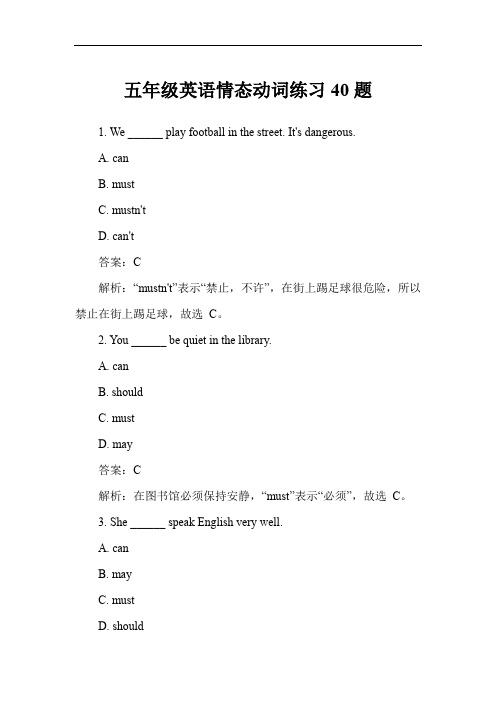
五年级英语情态动词练习40题1. We ______ play football in the street. It's dangerous.A. canB. mustC. mustn'tD. can't答案:C解析:“mustn't”表示“禁止,不许”,在街上踢足球很危险,所以禁止在街上踢足球,故选C。
2. You ______ be quiet in the library.A. canB. shouldC. mustD. may答案:C解析:在图书馆必须保持安静,“must”表示“必须”,故选C。
3. She ______ speak English very well.A. canB. mayC. mustD. should答案:A解析:“can”表示“能够”,她能够把英语说得很好,故选A。
4. We ______ listen to the teacher carefully in class.A. canB. mustC. mayD. should答案:B解析:在课堂上我们必须认真听老师讲课,“must”有“必须”的意思,故选B。
5. They ______ finish their homework on time.A. canB. mustC. mayD. should答案:B解析:“must”表示“必须”,他们必须按时完成作业,故选B。
6. We ______ play football yesterday because it rained. ()A. couldB. couldn'tC. canD. can't答案:B解析:yesterday 表明是一般过去时,根据“because it rained”可知因为下雨不能踢足球,could 是can 的过去式,couldn't 表示“不能”,故选B。
7. She ______ swim when she was five years old. ()A. couldB. canC. couldn'tD. can't答案:A解析:“when she was five years old”是一般过去时,could 表示过去的能力“能,会”,故选A。
【英语】情态动词练习题含答案及解析
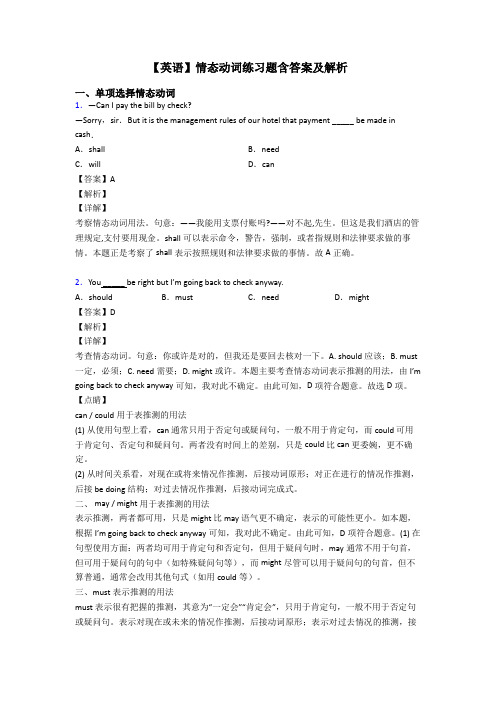
【英语】情态动词练习题含答案及解析一、单项选择情态动词1.—Can I pay the bill by check?—Sorry,sir.But it is the management rules of our hotel that payment _____ be made in cash.A.shall B.needC.will D.can【答案】A【解析】【详解】考察情态动词用法。
句意:——我能用支票付账吗?——对不起,先生。
但这是我们酒店的管理规定,支付要用现金。
shall可以表示命令,警告,强制,或者指规则和法律要求做的事情。
本题正是考察了shall表示按照规则和法律要求做的事情。
故A正确。
2.You _____ be right but I’m going back to check anyway.A.should B.must C.need D.might【答案】D【解析】【详解】考查情态动词。
句意:你或许是对的,但我还是要回去核对一下。
A. should应该;B. must 一定,必须;C. need需要;D. might或许。
本题主要考查情态动词表示推测的用法,由I’m going back to check anyway可知,我对此不确定。
由此可知,D项符合题意。
故选D项。
【点睛】can / could用于表推测的用法(1) 从使用句型上看,can 通常只用于否定句或疑问句,一般不用于肯定句,而could 可用于肯定句、否定句和疑问句。
两者没有时间上的差别,只是could 比 can 更委婉,更不确定。
(2) 从时间关系看,对现在或将来情况作推测,后接动词原形;对正在进行的情况作推测,后接 be doing 结构;对过去情况作推测,后接动词完成式。
二、 may / might用于表推测的用法表示推测,两者都可用,只是 might 比 may 语气更不确定,表示的可能性更小。
小学英语(完整版)情态动词专项练习附解析
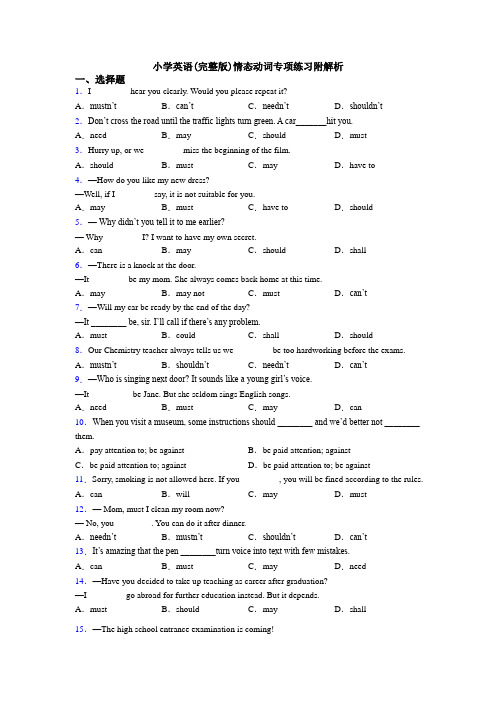
小学英语(完整版)情态动词专项练习附解析一、选择题1.I ________ hear you clearly. Would you please repeat it?A.mustn’t B.can’t C.needn’t D.shouldn’t 2.Don’t cross the road until the traffic lights turn green. A car_______hit you.A.need B.may C.should D.must3.Hurry up, or we ________ miss the beginning of the film.A.should B.must C.may D.have to4.—How do you like my new dress?—Well, if I ________ say, it is not suitable for you.A.may B.must C.have to D.should5.—Why didn’t you tell it to me earlier?— Why ________ I? I want to have my own secret.A.can B.may C.should D.shall6.—There is a knock at the door.—It ________ be my mom. She always comes back home at this time.A.may B.may not C.must D.can’t7.—Will my car be ready by the end of the day?—It ________ be, sir. I’ll call if there’s any problem.A.must B.could C.shall D.should8.Our Chemistry teacher always tells us we ________ be too hardworking before the exams. A.mustn’t B.shouldn’t C.needn’t D.can’t9.—Who is singing next door? It sounds like a young girl’s voice.—It _________ be Jane. But she seldom sings English songs.A.need B.must C.may D.can10.When you visit a museum, some instructions should ________ and we’d better not ________ them.A.pay attention to; be against B.be paid attention; againstC.be paid attention to; against D.be paid attention to; be against 11.Sorry, smoking is not allowed here. If you ________ , you will be fined according to the rules. A.can B.will C.may D.must12.— Mom, must I clean my room now?— No, you ________. You can do it after dinner.A.needn’t B.mustn’t C.shouldn’t D.can’t13.It’s amazing that the pen ________turn voice into text with few mistakes.A.can B.must C.may D.need14.—Have you decided to take up teaching as career after graduation?—I ________ go abroad for further education instead. But it depends.A.must B.should C.may D.shall15.—The high school entrance examination is coming!—Yes, our teacher tells us we _______ be too careful while taking exams.A.mustn't B.shouldn't C.needn't D.can't16.---Will you be back early this evening?---Yes, but I ________ be a little late. Our boss sometimes has extra work for us.A.may B.must C.need D.will17.We’ve discussed every detail of this plan and have got everything ready. But still something __________ go wrong. We still have to be very careful.A.must B.should C.would D.may 18.—Shall we go camping this summer holiday?—Nothing________be better.A.should B.could C.must D.may19.My bike was broken yesterday,so I____walk home.A.might B.had to C.must D.could 20.Exercise is helpful but it ________ be regular (规律的) exercise.A.must B.may C.can D.need 21.—Seventy dollars for such a dress! You ________ be joking!—I’m serious. It’s made of silk from Hangzhou.A.must B.need C.will D.can22.You _________ smoke here! Look at the sign. It says "No smoking".A.needn't B.mustn't C.can D.may23.— Listen! Tom ________ be listening to the music while doing his homework.—Let’s go upstairs to remind him to turn it off.A.should B.could C.would D.must24.We've discussed every detail of this plan and have got everything ready. But still something ________ go wrong. We still have to be very careful.A.must B.should C.would D.may 25.—Suzy described every detail of the accident just now.—Her memory ________ be completely back.A.shall B.need C.must D.could26.— Mum, why do I have to wash hands so many times a day?—You ________ be too careful, for your health.A.can’t B.mustn’t C.may not D.needn’t 27.—Will Jim come to Yangzhou for a holiday?—He ________come and it depends on how much homework he will have.A.may B.should C.must D.need28.— Is the boy over there Tom? He often wears a jacket like that.— It _______ be him. He is absent from school today.A.needn’t B.shouldn’t C.mustn’t D.can’t29.To avoid ________, we’d better ________ the parents’ me eting online.A.gather; hold B.gathering; hold C.gather; holding D.to gather; to hold 30.—Will dad arrive home at 6 o’clock to have dinner with us this evening?— I think he will, but he ________ not. Sometimes he works extra hours.A.can B.must C.need D.may 31.According to the rule, used batteries ________ be dropped in the red bin for harmful wastes. A.may B.would C.should D.might32.Cars ________ give way to walkers on some roads in Binhai, or the drivers will be fined. A.may B.will C.can D.must 33.You’ve got an A in the maths test again. You ________ be good at it.A.can B.may C.must D.should 34.—Mum, I bought some strawberries on my way home.—Oh, you’re so sweet. But the strawberries ________ be put into the fridge for freshness. A.must B.can C.may D.need35.— What do you think of the show yesterday?— Some of them were really good but others ________ be better.A.will B.must C.need D.can 36.—Who’s the man over there? Is that Mr. Black?—It ________ be him. Mr. Black is much taller than that man.A.may B.must C.can’t D.mustn’t 37.—________ I see your ID card? We have to check your personal information.—Sure. Here you are.A.May B.Need C.Should D.Must38.You ________ drive after drinking alcohol(酒). It’s against the law.A.mustn’t B.needn’t C.couldn’t D.wouldn’t 39.You ________ be careful with the camera. It costs!A.can B.will C.should D.may 40.—Shall I tell him the change of the time right now?—I’m afraid you ________, otherwise he will be late for the meeting.A.can B.may C.must D.need【参考答案】一、选择题1.B解析:B【详解】句意:我听不清你说什么。
初中英语情态动词专项练习
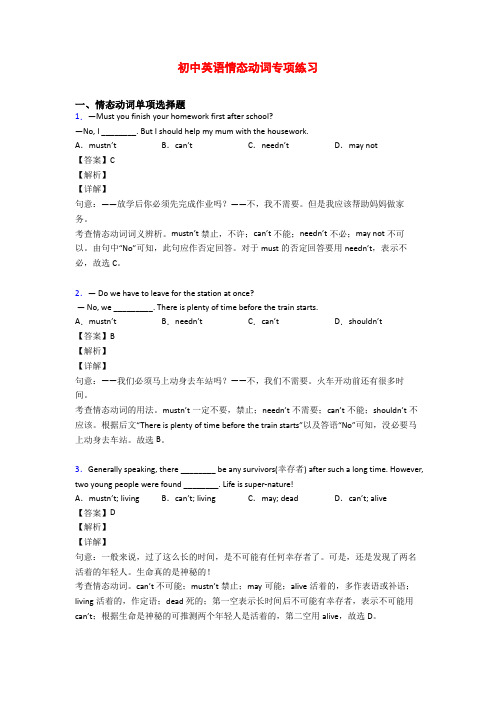
初中英语情态动词专项练习一、情态动词单项选择题1.—Must you finish your homework first after school?—No, I ________. But I should help my mum with the housework.A.mustn’t B.can’t C.needn’t D.may not【答案】C【解析】【详解】句意:——放学后你必须先完成作业吗?——不,我不需要。
但是我应该帮助妈妈做家务。
考查情态动词词义辨析。
mustn’t禁止,不许;can’t不能;needn’t不必;may not不可以。
由句中“No”可知,此句应作否定回答。
对于must的否定回答要用needn’t,表示不必,故选C。
2.— Do we have to leave for the station at once?— No, we _________. There is plenty of time before the train starts.A.mustn’t B.needn’t C.can’t D.shouldn’t【答案】B【解析】【详解】句意:——我们必须马上动身去车站吗?——不,我们不需要。
火车开动前还有很多时间。
考查情态动词的用法。
mustn’t一定不要,禁止;needn’t不需要;can’t不能;shouldn’t不应该。
根据后文“There is plenty of time before the train starts”以及答语“No”可知,没必要马上动身去车站。
故选B。
3.Generally speaking, there ________ be any survivors(幸存者) after such a long time. However, two young people were found ________. Life is super-nature!A.mustn’t; living B.can’t; living C.may; dead D.can’t; alive【答案】D【解析】【详解】句意:一般来说,过了这么长的时间,是不可能有任何幸存者了。
小学英语情态动词知识点及练习

情态动词【知识要点】:情态动词(Modal verbs)本身有一定的词义, 表示语气的单词。
但是不能独立作谓语, 只能和动词原形一起构成谓语。
情态动词用在行为动词前, 表示说话人对这一动作或状态的看法或主观设想。
情态动词虽然数量不多, 但用途广泛, 主要有下列: can (could), may (might), must, need, ought to, dare (dared), shall (should), will (would) must not.情态动词无人称和数的变化, 情态动词后面跟的动词须用原形, 否定式构成是在情态动词后面加 "not"。
疑问形式是将情态动词提至主语前。
个别情态动词有现在式和过去式两种形式, 过去式用来表达更加客气, 委婉的语气, 时态性不强, 可用于过去, 现在或将来。
情态动词属非及物动词, 故没有被动语态。
【典型例题】:【专题一】:can和could的用法【例1】Can you lift this heavy box?(体力)【解析】表示能力(体力、知识、技能)【练习】1.Mary speak three languages.(知识)2... yo.skate?(技能)此时可用be able to代替。
Can只有一般现在时和一般过去式;而be able to 则有更多的时态。
I’ll not be able to come this afternoon.当表示“经过努力才得以做成功某事”时应用be able to,不能用Can。
【例2】-----Can I go now?----.Yes.yo.can..No.yo.can’t.【解析】表示请求和允许。
此时可与may互换。
在疑问句中还可用could,might 代替,不是过去式,只是语气更委婉,不能用于肯定句和答语中。
【练习】---- I come to see you tomorrow?---.Yes.yo.....----No.yo..../I’.afrai.not.【例3】Can this be true?【解析】表示推测(惊讶、怀疑、不相信的态度),用于疑问句、否定句和感叹句中。
初中英语情态动词练习
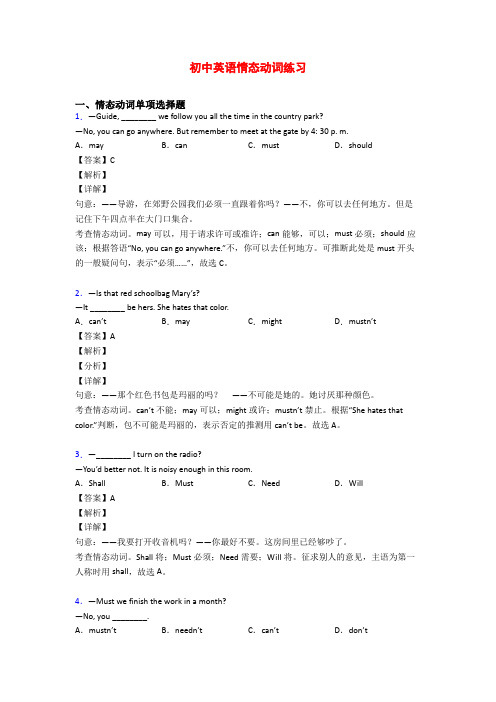
初中英语情态动词练习一、情态动词单项选择题1.—Guide, ________ we follow you all the time in the country park?—No, you can go anywhere. But remember to meet at the gate by 4: 30 p. m.A.may B.can C.must D.should【答案】C【解析】【详解】句意:——导游,在郊野公园我们必须一直跟着你吗?——不,你可以去任何地方。
但是记住下午四点半在大门口集合。
考查情态动词。
may可以,用于请求许可或准许;can能够,可以;must必须;should应该;根据答语“No, you can go anywhere.”不,你可以去任何地方。
可推断此处是must开头的一般疑问句,表示“必须……”,故选C。
2.—Is that red schoolbag Mary’s?—It ________ be hers. She hates that color.A.can’t B.may C.might D.mustn’t【答案】A【解析】【分析】【详解】句意:——那个红色书包是玛丽的吗?——不可能是她的。
她讨厌那种颜色。
考查情态动词。
can’t不能;may可以;might或许;mustn’t禁止。
根据“She hates that color.”判断,包不可能是玛丽的,表示否定的推测用can’t be。
故选A。
3.—________ I turn on the radio?—You’d better not. It is noisy enough in this room.A.Shall B.Must C.Need D.Will【答案】A【解析】【详解】句意:——我要打开收音机吗?——你最好不要。
这房间里已经够吵了。
考查情态动词。
Shall将;Must必须;Need需要;Will将。
高二英语情态动词推测用法练习题30题
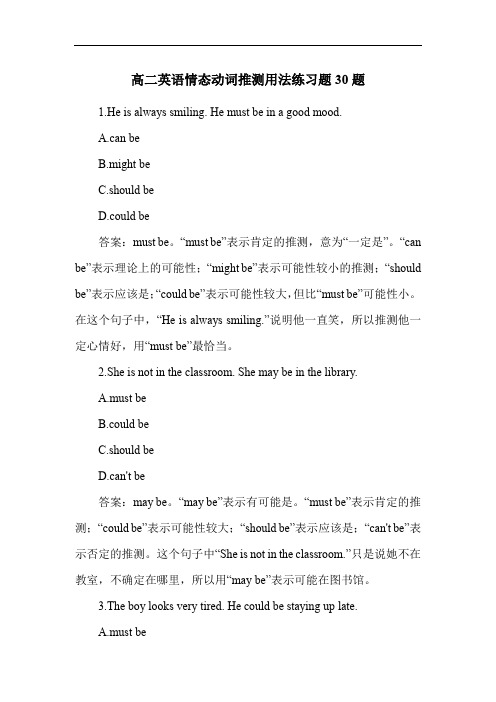
高二英语情态动词推测用法练习题30题1.He is always smiling. He must be in a good mood.A.can beB.might beC.should beD.could be答案:must be。
“must be”表示肯定的推测,意为“一定是”。
“can be”表示理论上的可能性;“might be”表示可能性较小的推测;“should be”表示应该是;“could be”表示可能性较大,但比“must be”可能性小。
在这个句子中,“He is always smiling.”说明他一直笑,所以推测他一定心情好,用“must be”最恰当。
2.She is not in the classroom. She may be in the library.A.must beB.could beC.should beD.can't be答案:may be。
“may be”表示有可能是。
“must be”表示肯定的推测;“could be”表示可能性较大;“should be”表示应该是;“can't be”表示否定的推测。
这个句子中“She is not in the classroom.”只是说她不在教室,不确定在哪里,所以用“may be”表示可能在图书馆。
3.The boy looks very tired. He could be staying up late.A.must beB.might beC.should beD.can't be答案:could be。
“could be”表示可能性较大的推测。
“must be”表示肯定的推测;“might be”表示可能性较小;“should be”表示应该是;“can't be”表示否定的推测。
这里“The boy looks very tired.”只是看起来累,所以用“could be”表示可能熬夜了。
【英语】 情态动词练习题(含答案)
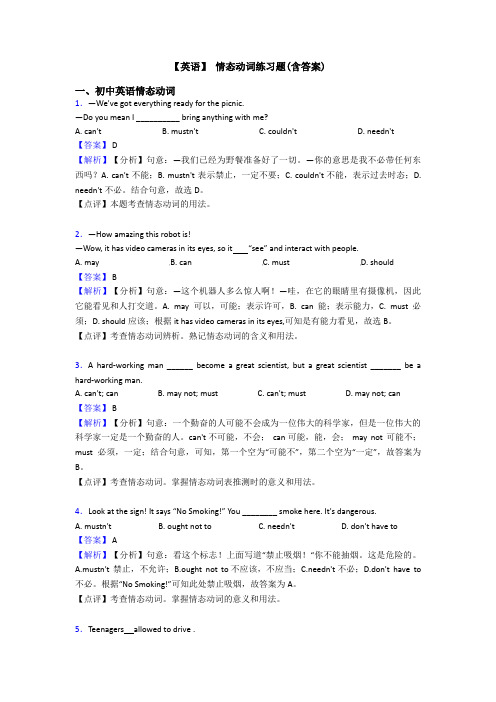
【英语】情态动词练习题(含答案)一、初中英语情态动词1.—We've got everything ready for the picnic.—Do you mean I __________ bring anything with me?A. can'tB. mustn'tC. couldn'tD. needn't【答案】 D【解析】【分析】句意:—我们已经为野餐准备好了一切。
—你的意思是我不必带任何东西吗?A. can't 不能;B. mustn't 表示禁止,一定不要;C. couldn't不能,表示过去时态;D. needn't不必。
结合句意,故选D。
【点评】本题考查情态动词的用法。
2.—How amazing this robot is!—Wow, it has video cameras in its eyes, so it “see” and interact with people.A. mayB. canC. mustD. should【答案】 B【解析】【分析】句意:—这个机器人多么惊人啊!—哇,在它的眼睛里有摄像机,因此它能看见和人打交道。
A. may 可以,可能;表示许可,B. can 能;表示能力,C. must 必须;D. should应该;根据it has video cameras in its eyes,可知是有能力看见,故选B。
【点评】考查情态动词辨析。
熟记情态动词的含义和用法。
3.A hard-working man ______ become a great scientist, but a great scientist _______ be a hard-working man.A. can't; canB. may not; mustC. can't; mustD. may not; can【答案】 B【解析】【分析】句意:一个勤奋的人可能不会成为一位伟大的科学家,但是一位伟大的科学家一定是一个勤奋的人。
- 1、下载文档前请自行甄别文档内容的完整性,平台不提供额外的编辑、内容补充、找答案等附加服务。
- 2、"仅部分预览"的文档,不可在线预览部分如存在完整性等问题,可反馈申请退款(可完整预览的文档不适用该条件!)。
- 3、如文档侵犯您的权益,请联系客服反馈,我们会尽快为您处理(人工客服工作时间:9:00-18:30)。
【英语】情态动词的练习一、单项选择情态动词1.I’m sorry, but you _____ go wrong. There’s no such man here.A.need B.can C.must D.will【答案】C【解析】【详解】考查情态动词。
句意:很抱歉,但是你一定是弄错了。
这儿没有这么个人。
A. need需要;B. can能够;C. must必须;D. will将会。
must指有把握的推测,“一定;必定”,结合下文There’s no such man here.可知一定是弄错了。
故选C。
2.Keep up your spirits even if you _____ fail hundreds of times.A.must B.needC.may D.should【答案】C【解析】【详解】考查情态动词。
A. must必须;B. need需要;C. may可能,或许;D. should应该。
句意:即使失败了几百次,也要振作起来。
此处表示一种不确定的推测,故选C。
3.—It’s really great to have a computer to stor e my photos.—Don’t count on it too much. It ________ break down and you’d better make a copy of them. A.must B.canC.should D.will【答案】B【解析】【详解】考查情态动词。
句意:——有一台计算机来储存照片真是太棒了。
——不要过度依赖它。
它有时候也会出故障,你最好做一个备份。
计算机出故障这是可能的事情,表示客观可能性用can。
must肯定,必须;should应该;will表意愿。
故B选项正确。
4.He is a bad-tempered fellow, but he ________ be quite charming when he wishes.A.shall B.shouldC.can D.must【答案】C【解析】【详解】考查情态动词辨析。
句意:他是个脾气不好的家伙,但当他希望自己有魅力的时候,他可以变得相当可爱。
此处表示“能、可以”,故C项正确。
5.One of our rules is that every student _______ wear school uniform while at school. A.might B.couldC.shall D.will【答案】C【解析】【详解】考查情态动词辨析。
句意:我们其中一条规则要求每个学生在校期间都要穿校服。
shall可以表示“命令,警告,强制要求;允诺;法律,规定要做……”,结合句意可知C正确。
6.he law is equally applied to everyone. No one _______ be above it.A.shall B.mustC.may D.need【答案】A【解析】【详解】考查情态动词。
句意:法律面前人人平等。
没有人能凌驾于法律之上。
A. shall用于第二、第三人称,则含有命令、警告、允诺或威胁的语气。
B. must(必须,一定)用于肯定句。
C. may(可以,能够)表允许时一般不与第三人称连用。
D. need (表示没有必要或询问是否有必要) 需要;故选A。
7.— Mum, little Ray broke his toys again!—It doesn't matter. You see, accidents _____happen.A.shall B.should C.must D.will【答案】D【解析】【详解】考查情态动词辨析。
句意:——妈妈,小雷又弄坏了他的玩具。
——没事的,你看,意外总会发生。
A. shall将要,会;B. should应当;C. must必须;D. will总是。
Will可以表示习惯,意思为“惯于,总是”。
故D选项正确。
【点睛】will/would是情态动词,其表达的意思如下。
(1)表示意志或意愿:决心,愿意,……好吗?We will do our best to save the child. 我们会尽力抢救这个孩子。
I told her to stop crying, but she just wouldn’t listen. 我叫她别哭,可她就是不愿听。
注:表示请求、建议或征求对方意见时,用Would you…? 比用Will you…?更婉转。
如:Will/Would you please keep the door open? 请让门开着好吗?Will/Would you go with me? 你愿意和我一起去吗?(2)表示真理或习惯:惯于,总是。
如:Oil will float on water. 油总是浮在水面上。
She will listen to music alone in her room for hours. 她独自在房间里听音乐,一听往往就是几小时。
He would get up early when he lived in the country. 他住在乡下时总是早起。
(3)表示要求:一定,必须。
如:You will report to me afterward. 你稍后一定要向我报告。
(4)表示猜测:可能,大概。
如:Th is will be the house you’re looking for. 这大概就是你找的那所房子了。
(5)表示功能:能。
如:This auditorium will/would seat one thousand people. 这个礼堂能容纳一千人分析句子可知,本句中的will表示习惯,意思为“惯于,总是”且符合语境。
故D选项正确。
8.-- Turn off the TV, Jack. _______ your homework now?-- Mum, just ten more minutes, please.A.Will you be doing B.Should you be doingC.Shouldn't you be doing D.Couldn’t you be doing【答案】C【解析】【详解】考查含情态动词的进行时态。
句意:——把电视关掉,杰克。
你现在不应该做作业吗?——妈妈,请再给我十分钟。
此处表示目前应该在做某事,should“应该”,这里用含情态动词的进行时态,故选C。
9.would可以表达过去常常做的事,过去习惯发生的动作:Pirates would bury gold in a cave. 海盗们常常把黄金藏在山洞中。
We would take a walk along the river. 我们过去常常沿河散步。
3. would后接like、love、mind等动词,表示要求、邀请、希望或询问,此时不是说过去,而是对现在的询问:Would you like to come to my party? 你愿意来我的派对吗?Would you mind coming with us? 你介意和我们一起吗?比如本题,would 表示婉转的请求,征求对方的意见,故选A。
10.Days later, my brother called to say he was all right, but _______say where he was. A.mustn’t B.shouldn’t C.wouldn’t D.mightn’t【答案】C【解析】考查情态动词。
句意:“数天后,我弟弟打电话说他很好,但不肯告诉我他在哪里。
”mustn’t“禁止”;shouldn’t“不应该”;wouldn’t“不情愿”;mightn’t“不可能”。
11.The new supermarket has announced that the first to purchase goods on the opening day ________ get a big prize.A.must B.couldC.would D.shall【答案】D【解析】【详解】考查情态动词的用法。
句意:新开业的超市宣布,开业当天首先购物的人会得到大奖。
shall 用于二三人称的陈述句中可以表示说话人的承诺,命令,警告等,此处表示超市的承诺,故选D。
12.Frankly speaking, I am not sure whether I ________ this in the old days with that kind of equipment, which looks quite odd and ridiculous.A.should have done B.need have done C.would have done D.must have done 【答案】C【解析】【详解】考查情态动词+have done。
句意:坦率地说,我不确定在过去我是否会用这种设备做这件事,这看起来很奇怪和可笑。
A. should have done表示本应该做某事,而实际上没有做某事;B. need have done表示本来需要做某事而没有做;C. would have done虚拟语气,表示对过去事情的假设,意思是“本来会做”;D. must have done表示对过去事情的肯定推测,译成“一定做过某事”。
由“in the old days”可知,本句表示对过去事情的假设。
故选C项。
13.No driving after drinking is a rule that every driver ____________ obey in our country. A.will B.shallC.may D.can【答案】B【解析】试题分析:考察情态动词。
A. 将要 B.将要 C.可能D.可以。
Will 表示请求、建议、意志、愿望和决心。
Shall用于第二、第三人称,表示说话人给对话的命令、警告、允诺或威胁。
May表示请求和允许;用于祈使句表示决心;表示推测、可能性。
Can表示能力;请求和允许。
句意:酒后驾车是每一位驾车者在我们国家应当遵守的规则。
故选B。
考点:考察情态动词14.—I don’t really like Janes. Why did you invite him?—Don’t worry. He come. He said he was’t certain what his plans were.A.must not B.need not C.would not D.might not【答案】D【解析】考察情态动词,题干中的he wasn’t certain说明他可能不来,可能来,因此使用不完全否定,might not。
